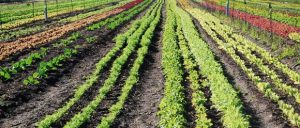Alternative Farming Options

Organic farming. Source: Beginning Farmers.
Industrialized agriculture has significant negative impacts on the environment. This type of farming creates monocultures which degrades plant and animal biodiversity (Horrigan, Leo, et all, 2002). There is also significant use of synthetic chemical fertilizers and pesticides which pollute the soil, water, and air, all of which harm both environment and human health (Horrigan, Leo, et all, 2002). In fact, pesticide use remains a large problem globally. The United Nations has estimated that 2 million poisonings and 10,000 deaths occur each year due to pesticides, the majority of these occurring in developing nations (Horrigan, Leo, et al, 2002). Soil erosion is another direct effect which causes loss of nutrients and as a result, reduces land fertility. Finally, water is consumed at unsustainable rates and often wasted as well due to runoff (Horrigan, Leo, et al, 2002). Industrial agriculture neglects other methods of farming as they can be more difficult to implement on a larger scale.
There are a variety of sustainable farming practices which have been found to be successful and relatively easy to implement. Crop rotation, or rotating the growth of two or more crops in a field, disrupts pest reproduction cycles and provides nutrients for the next crop, therefore reducing the need for pest control and fertilizer use (Horrigan, Leo, et al, 2002). Monocultures are especially susceptible to pests, so growing a variety of crops and increasing plant diversity will also reduce the need for pest control. Cover crops can be planted in the soil around crops to reduce exposed soil. This practice improves soil quality and prevents erosion and weed growth (Horrigan, Leo, et al, 2002). Using a rotational grazing method by continuously moving animals to different areas to graze, prevents soil erosion as it prevents overgrazing, and regulates the manure in these areas which contributes to soil fertility. Finally, no-till farming or low-till farming will reduce disturbing the soil and therefore prevents erosion, nutrient loss, and water runoff (Horrigan, Leo, et al, 2002).
However, some of these practices become a large issue with large scale farming. Organic farming is often viewed as significantly more environmentally friendly than non-organic farming. Studies have found that rises in certified organic farming correlate with a rise in overall greenhouse gas emissions as well as the emissions per acre of land (McGee 2004). The production of organic crops has actually been found to produce more carbon when done at the larger scale at which conventional farming is done (McGee 2004). This is believed to be due to the fact that there are smaller yields, which therefore requires more land use (McGee 2004). The clearing of this land causes the release of the carbon that has been sequestered in the plants (McGee 2004). There is also a higher dependence on machinery in the industrial organic model to make up for difficulties found with organic farming which, in turn, produces higher carbon emission as well (McGee 2004). Due to the downsides of both conventional and alternative farming methods, it is complicated to find the best method to farming as both have immense impacts on climate and, therefore, human health.